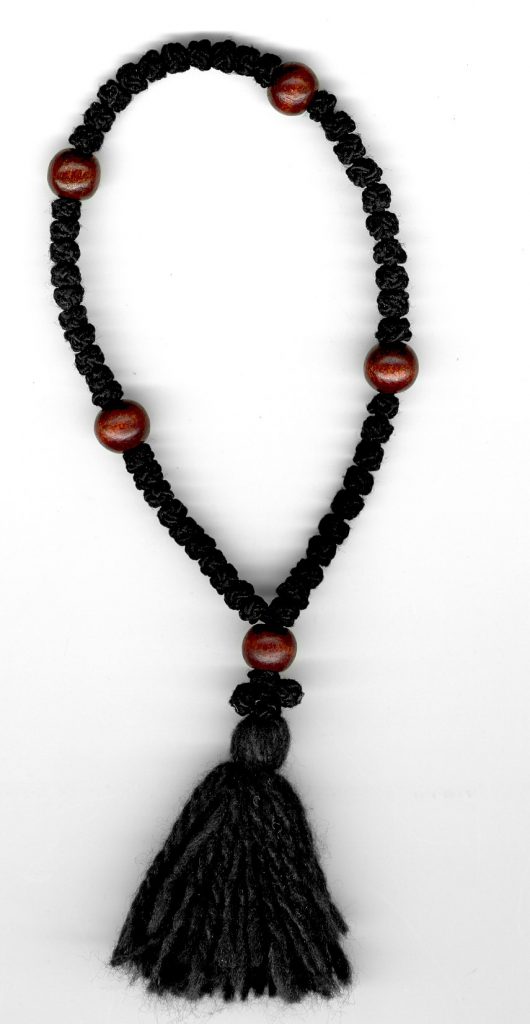 AJ asks: “I have been hearing about these beads called chokti beads that you use while praying and focusing on your breathing. Is this a Christian practice? It sounds eastern to me!”
AJ asks: “I have been hearing about these beads called chokti beads that you use while praying and focusing on your breathing. Is this a Christian practice? It sounds eastern to me!”
Most definitely. Chokti beads – or prayer ropes as they are also called – are part of the practice of Eastern Orthodox and Eastern-Catholic nuns and monks who use them to count the number of times they recite the Jesus Prayer. Although they are sometimes used by the laity, and for counting other prayers, this is their intended use.
Typically, the prayer rope (also known as a Komboskini) is used to keep one focused on reciting the Jesus prayer – “Lord Jesus Christ, Son of God, have mercy on me, a sinner.”
There is beautiful Christian symbolism in how these ropes are made and used. For example, the typical prayer rope has 33 beads, one for every year of Jesus’ life on earth. A knotted cross is fashioned where the rope joins to the tassel which is provided to dry tears wept in sorrow for sins. The rope is commonly fashioned out of wool which symbolizes the flock of Christ, and the usual color is black to signify mourning for sins. Some of the beads and at least a portion of the tassel is red which symbolizes the blood Jesus shed for our sins.
The prayer ropes in use today may have up to 103 beads and can be made out of different materials and colors, but their intended use remains the same as it has since ancient times that predate even the Rosary.
According to this site, the legend behind its creation concerns a monk named St. Pachomius the Great who was using the beads to pray when he suddenly had a vision of the Devil. The vision interrupted his concentration and when he returned to his rope, he found that all of the knots were untied. He re-tied them, went back to prayer, then had the same experience again. Finally, St. Gabriel came to him in a dream and showed him how to tie special knots that consisted of seven small interlocking crosses. When the devil appeared again and tried to untie the knots, he was unable to do so and was vanquished back to hell.
Although prayer ropes can have anywhere from 25 to 103 beads, they are still used to keep track of recitations of the Jesus Prayer which is said on every knot or bead.
As for the breathing element, recitation of the Jesus Prayer is supposed to accompany one’s natural breathing. For example, inhaling while reciting the first part of the prayer and exhaling when you say the second part. The object is to make the prayer become as automatic as breathing, thus fulfilling the exhortation of St. Paul in 1 Thessalonians 5:17 to “pray without ceasing.”
“The concept is to make it so that your corporeal and your spiritual are so intertwined that your breathe becomes a prayer in itself,” the site explains. ”When this prayer finally becomes somewhat automatic, the next step is to move the prayer from the head to the heart. One does this by trying to focus the prayer on the heart. The prayer itself is an act of humility calling out for God’s merciful help. This can sometimes even grant the gift of tears for repentance of your sins or tears of joy due to the love of God.”
Many people also invoke Our Lady’s intercession in the prayer by saying, “Lord Jesus Christ, by the intercession of the Mother of God, have mercy on me a sinner.”
It’s important to note that prayer ropes are not a substitute for the Rosary. As Johnnette Williams reminds in her book, The Rosary: Your Weapon for Spiritual Warfare, the Rosary’s long history of victory over evil is reason enough for it to remain in the hands of every Christian. In our day and time, which is so riddled by discord, immorality and vice, she says, the Rosary remains “the most effective way to battle the enemy’s forces invading our homes, our families, our community, our country and our culture.”
© All Rights Reserved, Living His Life Abundantly®/Women of Grace® http://www.womenofgrace.com









